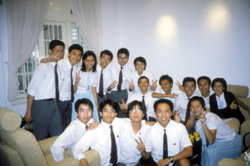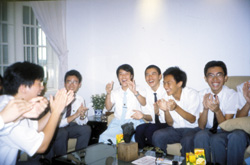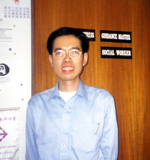 Online
Edition
Online
Edition | From
the editor Letters to the editor Milestone Answerman Periscope Campus Life Social Issues People Photo Features Education Channel Culture & Leisure Science |
| Last
Issue Archive |
| About
Varsity Advertise Media Links CUHK homepage JLM homepage |
Related
Links
Diocesan Boys' School
Department of Educational Administration and Policy, The Chinese University of Hong Kong
![]()
Co-education in single sex schools
By Sam Ho
|
Sam
Ho
 Last day farewell |
While most secondary schools in Hong Kong are co-educational, there still
are some single-sex schools.
The Diocesan Boys?School is a traditional single-sex school in Hong Kong. It was founded in the mid-19th century.
Mr. Chang Cheuk Cheung, the new principal of Diocesan Boys?School, organised an exchange programme with the Jockey Club Ti-I College, a co-educational school.
Through the exchange programme, he expects the boys to have more interaction with girls.
He also wants them to explore more and gain an understanding of students and campus life at other schools.
“I see no problem because the programme is not revolutionary. Boys and girls learning in the same classroom is absolutely natural.
|
Sam
Ho
 |
“Most students are extremely enthusiastic about the programme,?added he.
In the first stage, the programme received nearly 50 applications, even though only six places were available.
Parents have positive comments about the programme.
“The idea sounds good. Students can learn to interact with the opposite sex,?said the mother of a Form 1 student at the Diocesan Boys?School.
“My son is curious and feels awkward when he sees girls hanging around the school,? she added.
Participants are Form 4 and Form 6 students in the exchange programme. The first group started the exchange in mid-October.
Each group contains six students, and they go from their own school to another for a period of a week.
They have lessons at the exchange school for three days. Different groups are exchanged week by week.
Mrs. Phyllis Gul, an English teacher at the Diocesan Boys?School, said both the teachers and students are enthusiastic about the programme.
|
Sam
Ho
 The first group is reluctant to part. |
“We have changed since it started. Teachers are now more energetic, as if we have new blood and a new spirit,?said she.
In the near future, the Diocesan Boys?School will join the St. Stephen’s Girls?College as well.
Four girls and two boys formed the exchange group from Ti-I College.
After three days of exchange, they said they enjoyed the lessons.
Their impression of the Diocesan Boys?School was also changed.
“Before we came to the school, we thought this was a traditional school so the students would be highly disciplined ‘bookworms??said one of the participants.
“But now we think they are nice and friendly,?she said.
She said that Diocesan students have a strong sense of belonging to the school and are definitely not bookworms.
“Although three days is too short, it is just the beginning of our friendship. We will keep in touch afterwards,?she said.
Ms. Iris Wong, a participant in the first exchange group, said, “I like this school very much. I really would like to stay here, though I know it is impossible.?/font>
While exchange students from Ti-I College had fun, they also brought happiness to the Diocesan boys.
A Form 6 student at Diocesan Boys?School said, “The classroom atmosphere is better when the exchange students are with us. Lessons become more interactive, too.?
However, Ms. Cheung Sze Ming, another member of the exchange group, had a bad experience during the programme.
“I used a camera to record everything in the school. But a reporter wrongly accused me in an article.
“He wrote that a girl from Ti-I College recorded scenes of half-naked athletes playing on the basketball court,?said she.
“I have no reason to stare at boys here because there are also lots of boys in my school,?said she.
She said the article gives people a negative impression of her, as well as the programme.
There are other negative comments from the participants.
“I do not study applied mathematics in my school, but I was arranged to study it there for three days,?said Charles Shum, an exchange student from Ti-I College.
“I did my own work there instead during class,?he said.
On the other hand, Mr. Chang is satisfied with the programme.
“The first exchange group turned out with great success.
"I believe that this programme will be successful and able to fulfill our expectations,? said he.
A few students from single-sex schools were interviewed and asked to comment on this programme.
Most of them appreciated the idea. They said they would like their schools to organise such an activity.
Prof. Hung Fan Sing of the Department of Educational Administration and Policy at The Chinese University of Hong Kong, commented on the first exchange group.
“I think the programme is a very good try, though three days of exchange for each group may be too short,?said he.
“There is
a room for improvement,?he said. “I think that the programme is productive.
I feel optimistic about it." ![]()
| Communication
problems in single sex schools
By
Lilian Goh
Alyssa Lam is a 19-year-old graduate from a single sex primary school and secondary school. She said she copes with university life without difficulty. “I don’t feel shy, and there is no problem for me to communicate with boys,?said Miss Lam (not her real name). She admitted, though, that she did not have male friends in the past. “When boys call me, my parents look at me strangely,?she said, smiling. “They also say, ‘It’s a boy,?which makes me embarrassed.?/font> She said that being in an all girls' school reduced the possibility of troubles with love affairs. She concentrated on studies. However, there are love affairs in single sex schools. “Some boyish girls easily attract the attention of other girls,?said she. Miss Winnie Tam also graduated from a single sex school. She said homosexuality is rare at all girls' schools. But she added that there are ways to meet boys. “Besides joint school programmes, you can also make friends in libraries, study rooms or during summer jobs,?she said. She agreed that some girls dress like boys, but this does not mean they are lesbians. They only want to draw attention to themselves. “Because there are no boys at school, girls pay less attention to their manners. They sit improperly. You can see their underwear, and they don’t really care,?she added. Mr. Tai Sheung Kin is a graduate of the St. Francis Xavier’s School in Tsuen Wan. He said one of his classmates feels uneasy with girls. “He is very shy in front of girls,?Mr. Tai said. “If he knows that girls are going out with us, he will not join us.?/font> On the other hand, Mr. Tai admitted that there are few opportunities to meet friends of the opposite sex. “So I joined some extra-curricular activities like musical dramas run by Breakthrough to know more friends as well as to explore myself,? said Mr. Tai. Mr. Abraham Ng Wai Yat is the social worker at La Salle College. He said whether the single sex school students have communication problems with the opposite sex mainly depends on their personalities. “If students are active and outgoing, they can make many friends through various activities, no matter if they are the same sex or opposite sex,?said he. He also said that boys seldom admit their difficulties in communicating with girls, as they are afraid of losing face. “Due to peer pressure, boys often pretend that they have no difficulties and are unwilling to unveil their problems,?said he. Prof. Leung Seung Ming is an educational psychology professor at The Chinese University of Hong Kong. He said fewer single sex schools exist nowadays because of sexual equality. However, he had research pointing out communication problems in girls?schools. “Students from girls?schools seldom act as leaders when they deal with boys. “They let boys take up the leading roles. “They can display their abilities more easily in single sex schools,? Prof. Leung said.
|
